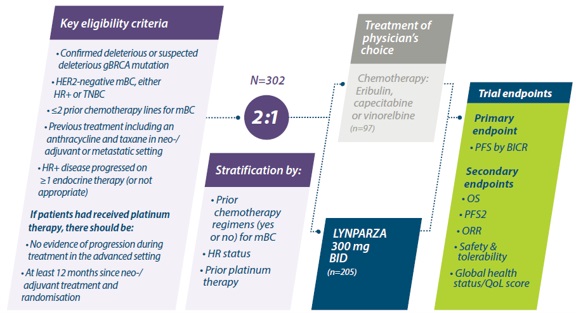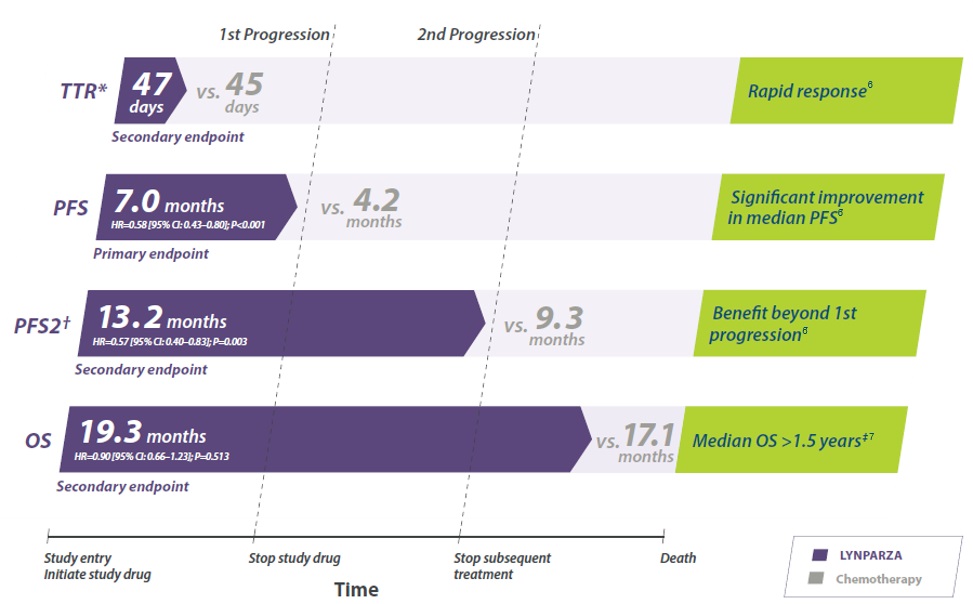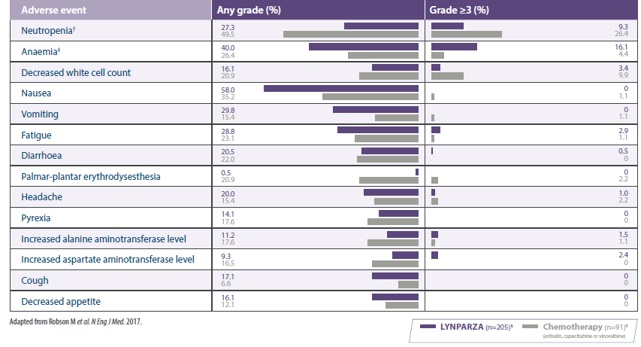Prostaatkanker
Voorschrijfinformatie
Therapeutische indicaties van prostaatkanker
Lynparza® is geïndiceerd als monotherapie voor de behandeling van volwassen patiënten met gemetastaseerde castratie- resistente prostaatkanker en BRCA1/2-mutaties (kiembaan en/of somatisch) die progressie hebben vertoond na eerdere behandeling met een nieuw hormonaal middel.1
BRCA=breast cancer gene
Dosering en toediening
Terugbetaling in België
Vanaf 1 april 2022 is Lynparza® (olaparib) als monotherapie terugbetaald voor de behandeling van volwassen patiënten met gemetastaseerde castratieresistente prostaatkanker en BRCA1/2-mutaties (kiembaan en/of somatisch) die progressie hebben vertoond na de vorige behandeling met een nieuw hormonaal middel (NHA) en die niet in aanmerking komen voor een behandeling met docetaxel (progressie of intolerantie of contra-indicatie) en cabazitaxel (contra-indicatie).2
Over Lynparza
Werkingsmechanisme
Olaparib is een sterke remmer van menselijke poly (ADP-ribose) polymerase-enzymen (PARP-1, PARP-2 en PARP-3) en het is aangetoond dat dit middel de groei van bepaalde tumorcellijnen in vitro en de groei van tumoren in vivo remt, ofwel als opzichzelfstaande behandeling of in combinatie met gevestigde chemotherapieën.1
Samenvattend: BRCAm tumoren hebben een unieke moleculaire biologie die hen gevoelig maakt voor PARP-remming.3,4
Lynparza remt PARP op twee manieren:†3-4
- Door de enzymatische activiteit te remmen3-4
- Door de vorming van gevangen PARP-DNA complexen te verhogen3-4
Samenvatting van de resultaten
PROfound: De eerste gerandomiseerde, gecontrolleerde, fase III studie van een PARPi in prostaatkanker5,6
*Determined by prospective tumour tissue testing – 15-gene panel.5
†Three patients in the LYNPARZA® arm in Cohort A had co-occurring mutations in both BRCA and ATM.7
‡Patients retreated with a different NHA; physician’s choice of either enzalutamide (160 mg QD) or abiraterone (1000 mg QD) + prednisone (5 mg BID).5
¶rPFS according to RECIST 1.1 & PCWG3 by BICR. ORR in evaluable patients with measurable disease at baseline, according to RECIST 1.1 by BICR5
§Key secondary endpoints were included in hierarchical testing for statistical significance.6,11
ATM = ataxia-telangiectasia mutated; BICR=blinded independent central review; BID=twice daily; BRCA = Breast cancer gene; HRR=homologous recombination repair; mCRPC=metastatic castration-resistant prostate cancer ; NHA=new hormonal agent; ORR=objective response rate; OS=overall survival; PARPi=poly (ADP-ribose) polymerase inhibitor; PCWG3=Prostate cancer Working Group 3; QD=once daily; RECIST=Response Evaluation Criteria in Solid Tumors; rPFS=radiographic progression-free survival.
Overall survival in BRCA gemuteerde patienten1,5
Data presented for 160 BRCA-mutated patients. 141 had single mutations in BRCA1 or BRCA2; 19 had BRCA1/2 and co-occurring mutations in other HRR genes.9
*The HR and CI were calculated using a Cox proportional hazards model that contains terms for treatment, factor and treatment by factor interaction. rPFS 71% maturity at data cut off.1
BRCA=breast cancer gene; BRCA1=breast cancer gene 1; BRCA2=breast cancer gene 2; CI=confidence interval; HR=hazard ratio; NHA=new hormonal agent; ORR=objective response rate; rPFS=radiographic progression-free survival.
Data presented for 160 BRCA-mutated patients. 141 had single mutations in BRCA1 or BRCA2; 19 had BRCA1/2 and co-occurring mutations in other HRR genes.9
*The HR and CI were calculated using a Cox proportional hazards model that contains terms for treatment, factor and treatment by factor interaction. rPFS 71% maturity at data cut off.1
BRCA=breast cancer gene; BRCA1=breast cancer gene 1; BRCA2=breast cancer gene 2; CI=confidence interval; HR=hazard ratio; NHA=new hormonal agent; ORR=objective response rate; rPFS=radiographic progression-free survival.
Radiografische progressie vrije overleving in BRCA gemuteerde patienten1,5
Data presented for 160 BRCA-mutated patients. 141 had single mutations in BRCA1 or BRCA2; 19 had BRCA1/2 and co-occurring mutations in other HRR genes.2
*The HR and CI were calculated using a Cox proportional hazards model that contains terms for treatment, factor and treatment by factor interaction. rPFS 71% maturity at data cut off.1
BRCA=breast cancer gene; BRCA1=breast cancer gene 1; BRCA2=breast cancer gene 2; CI=confidence interval; HR=hazard ratio; NHA=new hormonal agent; ORR=objective response rate; rPFS=radiographic progression-free survival.
Veiligheidsprofiel
Het veiligheidsprofiel dat werd waargenomen in PROfound5,10 was in overeenstemming met het algemene veiligheidsprofiel van LYNPARZA.®1
Nevenwerkingen gerapporteerd in ≥10% van patiënten in PROfound1,5,10
Pulmonary embolism occured in 5% of patient with Lynparza® vs 1% with NHA retreatment, none were fatal10
Safety data from PROfound is presented for the overall population, including BRCA1/2, ATM and 12 other HRR mutations. LYNPARZA® should only be prescribed in the appropriate indicated population.1,10
*Includes anaemia, decreased haemoglobin level, decreased red cell count, decreased haematocrit level, erythropaenia, macrocytic anaemia, normochromic anaemia, normochromic normocytic anaemia, and normocytic anaemia. Anaemia was reported in 49% of the patients, and a decreased haemoglobin level was reported in less than 1%.10
†One patient in the control group did not receive treatment.10
AE=adverse event; ATM=ataxia-telangiectasia mutated; BRCA1=breast cancer gene 1; BRCA2=breast cancer gene 2; HRR=homologous recombination repair; NHA=new hormonal agent.
Genetische testing
Klik hier voor een gedetailleerde infographic omtrent genetische testing.
Tumor testing* is reimbursed for mCRPC patients
- Germline testing is recommended in patients with a family history of cancer and should be considered in all patients with metastatic prostate cancer
- *If BRCA mutations in tumour are found, refer to genetic counselling for confirmatory germline testing.11,12
BRCA=breast cancer gene; BRCA1=BReast CAncer gene 1; BRCA2=breast cancer gene 2; mCRPC=metastatic castration-resistant prostate cancer; NHA=new hormonal Agent
Hulpbronnen en materialen
Klinische studies
PROfound
Professor Lumen en dr De Maeseneer bespreken de resultaten van de PROfound trial en wat de terugbetaling betekent voor uw patiënten
MoA en genetische testing
Gedetailleerde infographic omtrent genetische testing
Educational videos
Prof. Dr. Sautois on PROfound trial: clinical results
Dr. De Putter on germline genetic testing in prostate cancer
Prof. Dr. Pauwels on the failure rate for tissue BRCA testing in clinical practice
Prof. Dr. Pauwels on what we learned from the PROfound trial
'Dr. De Putter on why we should do a tissue test after a negative germline test
Voor patiënten
Dagboek voor Lynparza patiënten
Evenementen
Momenteel zijn er geen evenementen.
Referenties
1. LYNPARZA® 100 mg and 150 mg tabletten, samenvatting van de productkenmerken, meest recente versie
2. https://ondpanon.riziv.fgov.be/SSPWebApplicationPublic/nl/Public/ProductSearch (accès 25/10/2021)
3. O’Connor MJ. Targeting the DNA damage response in cancer. Mol Cell. 2015; 60(4):547–560.
4. Lord CJ and Ashworth A. PARP inhibitors: The first synthetic lethal targeted therapy. Science. 2017;355(6330):1152–1158.
5. de Bono J et al. Olaparib for metastatic castration-resistant prostate cancer . N Engl J Med. 2020;382(22):2091–2102.
6. de Bono J et al. Poster 847PD. Central, prospective detection of homologous recombination repair gene alterations in tumour tissue from >4000 men with metastatic castration-resistant prostate cancer screened for the PROfound study. Presented at: ESMO Annual Meeting; 27 September-1 October, 2019; Barcelona, Spain.
7. de Bono J et al. Olaparib for metastatic castration-resistant prostate cancer. N Engl J Med. 2020;382(22):2091–2102. Supplementary appendix.
8. de Bono J et al. Olaparib for metastatic castration-resistant prostate cancer. N Engl J Med. 2020;382(22):2091–2102. Protocol.
9. de Bono J et al. Central, prospective detection of homologous recombination repair gene alterations in tumour tissue from >4000 men with metastatic castration-resistant prostate cancer screened for the PROfound study. Poster 847PD. Presented at ESMO Annual Meeting, 27 September–1 October 2019, Barcelona, Spain.
10. Hussain M et al. Survival with olaparib in metastatic castration-resistant prostate cancer. N Engl J Med. 2020. doi: 10.1056/NEJMoa2022485.
11. Parker C et al. Prostate cancer: ESMO Clinical Practice Guidelines for diagnosis, treatment and follow-up. Ann Oncol. 2020;31(9):1119–1134.
12. Cheng HH et al. Germline and somatic mutations in prostate cancer for the clinician. J Natl Compr Canc Netw. 2019;17(5):515– 521.
13. Abida W et al. Prospective genomic profiling of prostate cancer across disease states reveals germline and somatic alterations that may affect clinical decision making. JCO Precis Onco. 2017. doi: 10.1200/PO.17.00029
.jpg)







